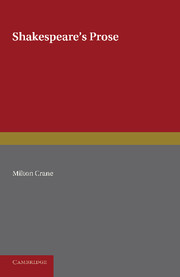III - Dramatic Prose in Later Elizabethan and Jacobean Drama
Published online by Cambridge University Press: 05 June 2016
Summary
Shakespeare's prose appears in all its richness and variety when his plays are compared with those of his immediate contemporaries, all of whom made use of prose to some extent. The quality of their prose is often very high; one need only recall the comic prose of Dekker or the strange, melancholy prose of Webster's Flamineo. The line of division between prose and verse is in general clearly marked, although the breakdown of blank verse in the Jacobean drama begins to blur the formal distinction.
What one too rarely finds in these playwrights are the subtle and varied uses of prose, the skillful invention in dramatic technique and style which give Shakespeare's prose its peculiar excellence. Jonson elaborately develops the prose styles of his characters, but he does so in an all-prose play, foregoing the dramatic and stylistic balance which Shakespeare achieves by opposing the two media. Webster keeps the form of the prose-verse play, but reserves prose in the main for a single figure, whose prose then becomes a significant facet of his character. One seeks in vain another Hamlet or Lear or Rosalind, who can speak both prose and verse with consummate skill and beauty. The answer is not far to seek: the creator of Hamlet knew best how Hamlet should speak; another artist capable of creating a Hamlet would not have found problems of technique insuperable.
A brief examination of the uses of prose in the works of Shakespeare's contemporaries and successors, like the study in the previous chapter, will help to establish a basis for judging Shakespeare's achievement and may illuminate some aspects of Shakespeare's practice.
These playwrights often differ in their treatment of common problems of technique; such points of divergence, both significant and insignificant, are interesting as revelatory of the writers' several reactions to a convention of their art, and as such they are of value for this discussion. One cannot use them in the vain hope of establishing the precise influence of Shakespeare's use of prose on his colleagues or of theirs on him, more than to show, as Henry W. Wells has done, that Shakespeare's extensive use of prose established dramatic prose as an important form for other dramatists. It seems, on the whole, less misleading to overemphasize the dramatists' independence than to exaggerate their interdependence.
- Type
- Chapter
- Information
- Shakespeare's Prose , pp. 32 - 65Publisher: Cambridge University PressPrint publication year: 2013

